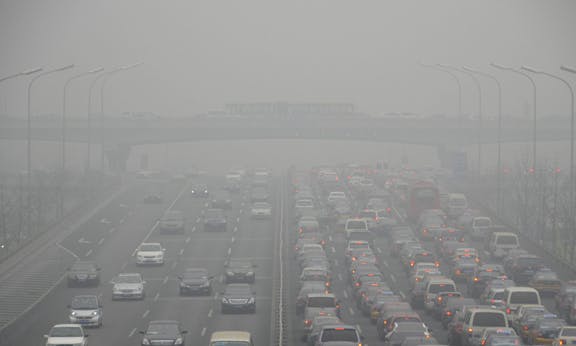Pollution is killing us

While the world’s attention has been focused on climate change, another environmental problem has been inflicting death and destruction on a massive scale. According to the findings of a breakthrough new report, the health impacts of pollution may pose an even bigger threat to humanity than global warming.
The “Commission on pollution and health”, published in October in the journal of the British Medical Association, the Lancet, brought together research by a team of 47 scientists around the world. Its findings are terrifying.
The headline figure is that pollution causes 9 million premature deaths a year. This is 16 percent of total deaths in any year, making it the leading cause of death worldwide. The report notes that this is “three times more deaths than from AIDS, tuberculosis, and malaria combined and 15 times more than from all wars and other forms of violence”.
The report found that air pollution was the biggest cause of death. Outdoor air pollution, such as smoke and chemical emissions from industry and transport, caused 4.5 million deaths. Indoor air pollution, an issue mainly affecting the world’s poorest people, who still rely on wood and dung stoves, caused 2.9 million deaths.
Significantly, pollution of workplaces, which includes things like exposure to toxic chemicals, smoke and asbestos, kills 800,000 a year – something to remember next time you hear about a union being fined for taking action over workplace health and safety issues.
Considering the lack of understanding, for instance, of how the widespread presence of potentially dangerous chemicals in our food might be linked to increasing rates of cancer and other diseases, the report’s authors believe the figure of 9 million may be an understatement. Professor Philip Landrigan of the Icahn School of Medicine in New York, one of the leading contributors to the report, told the Guardian:
“I worry we have created a situation where people are exposed to chemicals that are eroding intelligence or impairing reproduction, or weakening their immune system, but we have not yet been smart enough to make the connection between the exposure and the outcome, because it is subtle.”
In the long term, pollution may affect the environment and human health in unexpected and catastrophic ways. Several other recent reports illustrate the point.
A study of sperm counts among men in Western countries, published in the journal Human Reproduction Update, found that male fertility had declined by over 50 percent in the past 40 years. Scientists are unclear on why this might be happening, but there are indications that the ubiquity of chemical pollutants may be playing a role.
Then there’s a widely cited report from Germany that found insect numbers across 63 German nature reserves had collapsed by 75 percent over the past 27 years. Again, it’s thought that chemicals, particularly pesticides used in modern agriculture, may be to blame.
The authors of the Lancet piece aren’t exaggerating when they conclude: “Pollution endangers the stability of the Earth’s support systems and threatens the continuing survival of human societies”.
If we compare those 9 million deaths from pollution to the 25,600 deaths caused by terrorism in 2016 (only a small fraction of which occurred in the West), we may wonder why we don’t have a “war on pollution” instead of a “war on terrorism”.
A small portion of the trillions spent by the US and other countries on their militaries over the past two decades could have gone a long way to fixing this problem. But our leaders aren’t interested in doing anything about it.
The reason is simple: while pollution may be an issue for society, for the capitalists who run the show, it’s profitable. Why bother with cleaning up your own mess when you can just dump it on someone else’s doorstep?
This is capitalism 101. To counter this environmental vandalism we need socialism 101 – a society organised, not around the greed of individual capitalists, but around the collective health and well-being of society.